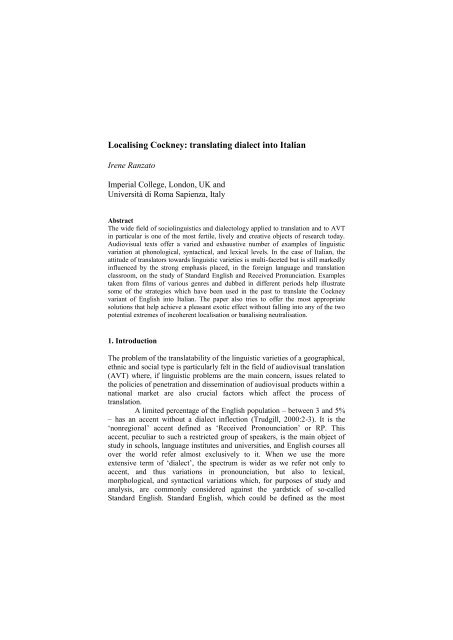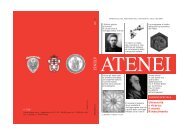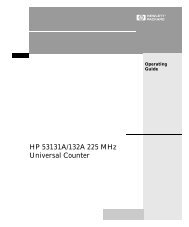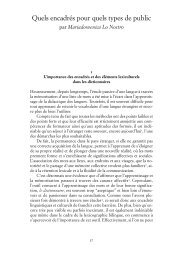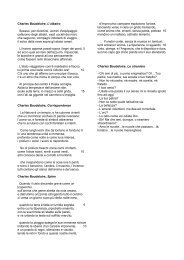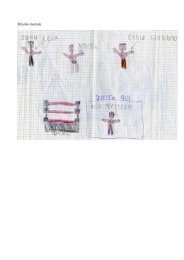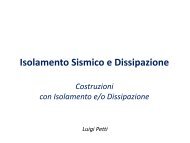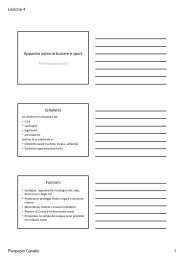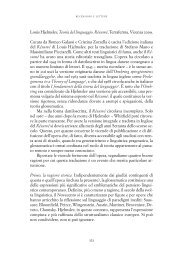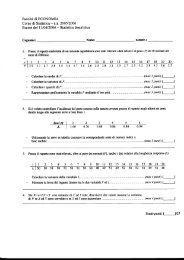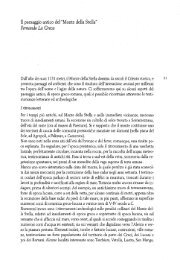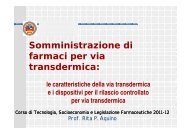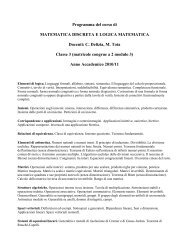Localising Cockney: translating dialect into Italian - Università degli ...
Localising Cockney: translating dialect into Italian - Università degli ...
Localising Cockney: translating dialect into Italian - Università degli ...
Create successful ePaper yourself
Turn your PDF publications into a flip-book with our unique Google optimized e-Paper software.
<strong>Localising</strong> <strong>Cockney</strong>: <strong>translating</strong> <strong>dialect</strong> <strong>into</strong> <strong>Italian</strong><br />
Irene Ranzato<br />
Imperial College, London, UK and<br />
<strong>Università</strong> di Roma Sapienza, Italy<br />
Abstract<br />
The wide field of sociolinguistics and <strong>dialect</strong>ology applied to translation and to AVT<br />
in particular is one of the most fertile, lively and creative objects of research today.<br />
Audiovisual texts offer a varied and exhaustive number of examples of linguistic<br />
variation at phonological, syntactical, and lexical levels. In the case of <strong>Italian</strong>, the<br />
attitude of translators towards linguistic varieties is multi-faceted but is still markedly<br />
influenced by the strong emphasis placed, in the foreign language and translation<br />
classroom, on the study of Standard English and Received Pronunciation. Examples<br />
taken from films of various genres and dubbed in different periods help illustrate<br />
some of the strategies which have been used in the past to translate the <strong>Cockney</strong><br />
variant of English <strong>into</strong> <strong>Italian</strong>. The paper also tries to offer the most appropriate<br />
solutions that help achieve a pleasant exotic effect without falling <strong>into</strong> any of the two<br />
potential extremes of incoherent localisation or banalising neutralisation.<br />
1. Introduction<br />
The problem of the translatability of the linguistic varieties of a geographical,<br />
ethnic and social type is particularly felt in the field of audiovisual translation<br />
(AVT) where, if linguistic problems are the main concern, issues related to<br />
the policies of penetration and dissemination of audiovisual products within a<br />
national market are also crucial factors which affect the process of<br />
translation.<br />
A limited percentage of the English population – between 3 and 5%<br />
– has an accent without a <strong>dialect</strong> inflection (Trudgill, 2000:2-3). It is the<br />
„nonregional‟ accent defined as „Received Pronounciation‟ or RP. This<br />
accent, peculiar to such a restricted group of speakers, is the main object of<br />
study in schools, language institutes and universities, and English courses all<br />
over the world refer almost exclusively to it. When we use the more<br />
extensive term of „<strong>dialect</strong>‟, the spectrum is wider as we refer not only to<br />
accent, and thus variations in pronounciation, but also to lexical,<br />
morphological, and syntactical variations which, for purposes of study and<br />
analysis, are commonly considered against the yardstick of so-called<br />
Standard English. Standard English, which could be defined as the most
Irene Ranzato<br />
successful of English <strong>dialect</strong>s, is the English normally used in the written<br />
form and spoken by the majority of the cultured population in England –<br />
again, the English normally studied in schools and language institutes –, but<br />
it is actually spoken by no more than 12 to 15% of the English population<br />
(ibid.). 1<br />
It is obvious that, besides the geographical variants, every region<br />
also offers a social spectrum of variations, with Standard English being the<br />
„prestigious‟ <strong>dialect</strong>, spoken by people at the top of the social spectrum, and a<br />
number of nonstandard variations in the other social strata. Although the<br />
word „<strong>dialect</strong>‟ refers to a way of speaking a language which is different from<br />
the standard, and not to an incorrect way of speaking a language, as it is often<br />
erroneously perceived, nonstandard <strong>dialect</strong>s are often associated with the<br />
language spoken by the „have nots‟ of society: those without power, less<br />
economically well off and less socially prominent, with little or no education.<br />
While legitimate linguistically, these <strong>dialect</strong>s tend to be stigmatised by the<br />
„haves‟ of society.<br />
The wide field of sociolinguistics and <strong>dialect</strong>ology, applied to<br />
translation and to AVT in particular, is one of the most fertile, lively and<br />
creative objects of research today. The particular interest in applying it to<br />
AVT lies in the fact that, thanks to the audio and visual dimensions, no other<br />
texts offer such a complete, varied and exhaustive number of examples of all<br />
sorts of linguistic variations and, thus, a practically infinite number of<br />
phonological, syntactical, and lexical objects of analysis. The films by British<br />
directors Ken Loach and Mike Leigh, for instance, are prime examples of the<br />
wealth of material available to researchers, since both directors take a stark<br />
look at society and at people as they really are and as they really speak.<br />
Nonetheless, despite the wealth of information available in the fields<br />
of sociolinguistics and <strong>dialect</strong>ology, the approach to the translation of <strong>dialect</strong><br />
is generally superficial, dilettantesque or simply heedless of the problem. It is<br />
no wonder that if, as has been argued, the focus in the study of the English<br />
language is exclusively on Standard English and RP, the translator will not be<br />
sufficiently trained to pay much attention to any variations from the norm. It<br />
is thus of crucial importance to expose students, from a very early stage, to<br />
literary and audiovisual programmes which reflect the varied linguistic and<br />
social specificities of other cultures.<br />
2. New trends in dubbing<br />
The situation in Italy concerning the attitude of translators towards linguistic<br />
varieties is a complex one. Holmes (1988:49) makes the following distinction<br />
between the diachronic and the synchronic axes in the course of the 20 th<br />
century:<br />
110
<strong>Localising</strong> <strong>Cockney</strong>: <strong>translating</strong> <strong>dialect</strong> <strong>into</strong> <strong>Italian</strong><br />
a marked tendency towards modernization and naturalization of the<br />
linguistic context, paired with a similar but less clear tendency in the same<br />
direction in regard to the literary intertext, but an opposing tendency<br />
towards historicizing and exoticizing in the socio-cultural situation.<br />
Trying to apply Holmes‟s reflection to feature films, the tendency that seems<br />
to be the most explicit and generalised in Italy nowadays goes in the direction<br />
of a modernisation of the linguistic context, accompanied by an exoticizing<br />
of the socio-cultural content, which is achieved by keeping unaltered some<br />
lexical items and by using stylistic devices which succeed in maintaining the<br />
linguistic flavour of the original. This tendency is more evident if we<br />
compare films from the 1980s onwards to the films produced in the decades<br />
before the 1970s, though the change has been gradual and never abrupt, and<br />
it allows for a number of exceptions.<br />
Two recent examples, based on Spanish films, are in this sense<br />
particularly interesting. In the film Mar Adentro, a multi-awarded 2004<br />
feature film by Alejandro Amenábar, dealing with a euthanasia case, the<br />
effort in <strong>translating</strong> and adapting the film <strong>into</strong> <strong>Italian</strong> was to keep in the<br />
dubbed version the original flavour of the original work. This is achieved by<br />
maintaining the cadence of the Spanish language at various moments in the<br />
dialogue, a characteristic which is evident especially in the dubbing of the<br />
main character who, as a result, has in <strong>Italian</strong> a voice and a way of speaking<br />
that are very similar to the original. Però, perché?, the protagonist‟s nephew<br />
protests in one scene in the film; però, no, we hear in other instances. This is<br />
not, strictly speaking, <strong>Italian</strong>: an <strong>Italian</strong> would say Ma perché?, as però is too<br />
emphatically adversative to be used in such an instance. The message that the<br />
adaptation of this film intends to convey is that it is a Spanish film and proud<br />
to be so. 2<br />
Another example comes from the film by Pedro Almodóvar, La<br />
mala educación (2004). The adapters <strong>into</strong> <strong>Italian</strong> have chosen to let one of<br />
the main characters keep his Spanish identity and speak <strong>Italian</strong> with a strong<br />
Spanish accent. The idea of having the Spanish actor Javier Cámara dub his<br />
own role in <strong>Italian</strong> was Pedro Almodóvar‟s himself, as dubbing director<br />
Francesco Vairano stated in an interview (in Bonardelli, 2004/05). This<br />
unusual policy serves to emphasise the exoticism of the product, reminding<br />
the viewers of the Spanish nature of the original. This relatively new trend in<br />
the <strong>Italian</strong> adaptation of audiovisual programmes is certainly very different<br />
from past approaches in which adapters would replace the then almost<br />
unknown „peanut butter‟ of the original with the word formaggio [cheese] in<br />
Some Like It Hot (Billy Wilder, 1959), or mention the generic università<br />
[universities] instead of specifically Harvard, to meet the tastes of a public<br />
111
Irene Ranzato<br />
presumably ignorant and scarcely receptive towards the new (Bovinelli and<br />
Gallini, 1994:93).<br />
The tendency to allow the exoticism of another language and culture<br />
to surface in the translated text is not accompanied by a similar effort when<br />
dealing with <strong>dialect</strong>s. Considering that <strong>dialect</strong>s are a clearly exotic element<br />
that translators could be tempted to preserve, their absence from the dubbed<br />
versions could be regarded as a countertendency. Indeed, dubbed cinema<br />
seems to have opted for the standardisation of <strong>dialect</strong>al variants and has<br />
generally abandoned the „parodistic‟ tendency to translate foreign <strong>dialect</strong>s<br />
with <strong>Italian</strong> <strong>dialect</strong>s, a choice which, according to Di Giovanni et al. (1994),<br />
has now become unpopular and is often stigmatised for being politically<br />
incorrect and absolutely arbitrary.<br />
As Galassi (1994) remarks, the use of <strong>dialect</strong> in Italy has a comic<br />
connotation. Generally it is not intended to convey a socio-cultural message,<br />
maybe because of its humoristic origins in the Commedia dell‟Arte. Its use is<br />
thus generally perceived as unsuitable for dramatic films, with the exception<br />
of the (often artificial) Sicilian mafia which is deemed suitable to all genres,<br />
from The Godfather (Francis Ford Coppola, 1972) to The Sopranos (David<br />
Chase et al., 1999-2007). Apart from this exception, <strong>dialect</strong>s are often<br />
neutralised in translation or resolved synctactically by utilising „wrong‟<br />
expressions and lexically by resorting to a highly informal way of speaking,<br />
geographically unlocalised and socially unmarked.<br />
It is worth remembering that the effacement of <strong>dialect</strong>s has deep<br />
historical roots in Italy, ever since 1933 when a piece of legislation was<br />
passed forcing the dubbing of films to take place on <strong>Italian</strong> territory. From<br />
then on, the government would exert greater linguistic control over the<br />
„purity of the <strong>Italian</strong> language‟ and insist on the disappearance of <strong>dialect</strong>s,<br />
regionalisms and accents. American films, the majority of the films imported,<br />
were to be dubbed in an „abstract‟ <strong>Italian</strong>, thus contributing to the effort of<br />
cultural homogenisation and regional uprooting which was one of the aims of<br />
fascism. From this point of view, as mentioned by Gili (1981:37), the foreign<br />
film to be dubbed was a more flexible product than an original <strong>Italian</strong> film.<br />
3. <strong>Cockney</strong> and Estuary English<br />
In what follows, I would like to concentrate on some of the solutions adopted<br />
by <strong>Italian</strong> translators in the dubbing of the London accent, both in its<br />
traditional <strong>Cockney</strong> form and in its modern development of rapidly<br />
expanding Estuary English. The traditional <strong>Cockney</strong> <strong>dialect</strong> includes a<br />
number of typical phonetic and grammatical features, among which are:<br />
112
<strong>Localising</strong> <strong>Cockney</strong>: <strong>translating</strong> <strong>dialect</strong> <strong>into</strong> <strong>Italian</strong><br />
„th‟ fronting, which involves the replacement of the dental fricatives, /θ/<br />
and /ð/ by labiodentals [f] and [v] respectively, as in words like „mother‟<br />
(muvver) and „think‟ (fink);<br />
dropped „h‟, as in „house‟ („ouse);<br />
„t‟-glottalisation: use of the glottal stop as an allophone of /t/ in various<br />
positions, especially the use of a glottal stop for intervocalic /t/, as in<br />
„bottle‟ or „butter‟. Also /p,t,k/ are almost invariably glottalised in the final<br />
position;<br />
many vowel and diphthong alterations, including /eɪ/ → [æɪ~aɪ] as in take<br />
= tyke; /aʊ/ may be [æə] or a monophthongal [æː~aː] as in round = raand,<br />
house = „aase;<br />
vocalisation of dark „l‟, thus [mɪok] for „milk‟;<br />
use of „ain‟t‟ instead of „isn‟t‟, „am not‟, „are not‟, „has not‟, and „have not‟;<br />
use of „me‟ instead of „my‟.<br />
<strong>Cockney</strong> English is also characterised by its distinctive rhyming slang. In this<br />
traditional feature, you take a pair of associated words, „porky and pies‟, where<br />
the second word rhymes with the word you intend to say, „lies‟, then use both<br />
or sometimes only the first word of the associated pair to indicate the word you<br />
originally intended to say. Some rhymes have been in use for years, for<br />
example: “apples and pears” = stairs, “plates of meat” = feet. There are others,<br />
however, that became established with the changing culture, for example “John<br />
Cleese” = cheese.<br />
Since the mid 1990s, a number of studies have reported <strong>dialect</strong><br />
levelling, by which differences between local accents/<strong>dialect</strong>s are reduced,<br />
features which make them distinctive disappear, and new features are<br />
developed and adopted by speakers over a wide area. Levelling is thought to<br />
centre on large urban areas, such as Tyneside or London in the UK, from which<br />
new features disseminate, and within whose reach high degrees of contact and<br />
mobility may lead to linguistic homogenisation. Estuary English is the only<br />
regional levelling process to receive a name and to become the subject of<br />
public debate. It is a popular variety of spoken Standard English with phonetic<br />
features placing it between RP and broad London <strong>Cockney</strong>. First described by<br />
Rosewarne (1984), it was characterised as follows:<br />
Estuary English is a variety of modified regional speech. It is a mixture of<br />
nonregional and local south-eastern English pronunciation and <strong>into</strong>nation. If<br />
one imagines a continuum with RP and popular London speech at either<br />
end, Estuary English speakers are to be found grouped in the middle ground.<br />
They are „between <strong>Cockney</strong> and the Queen‟, in the words of The Sunday<br />
Times (Rosewarne, 1994: 3).<br />
113
Irene Ranzato<br />
Estuary English actually spans a very wide range of accents, from near-<br />
<strong>Cockney</strong> to near-RP, so it is difficult to call it a „variety‟. A realistic approach<br />
to Estuary English is to see it as referring to a set of levelled (relatively<br />
homogenised) regional – as opposed to local – accents or <strong>dialect</strong>s spoken in<br />
the south-east of England. These varieties, and their counterparts throughout<br />
the British Isles, are a result of greatly heightened mobility since the period<br />
just after the Second World War, and a change in ideology that allowed non-<br />
RP users to take up a range of occupations, especially in broadcasting, from<br />
which they had been formerly barred (Kerswill, 2006:14).<br />
4. My Fair Lady<br />
The dubbing of the 1964 film My Fair Lady is both a typical and extreme<br />
way of treating <strong>dialect</strong> in dubbing translation; an example which, whatever<br />
the opinion on the final result, might encourage translators to find more<br />
creative strategies beyond that of the levelling of register to deal with<br />
<strong>dialect</strong>al specificities.<br />
The film by George Cukor, based on George Bernard Shaw‟s<br />
Pygmalion, deliberately keeps the theatrical atmosphere of the play on which<br />
it is based: the use of stage settings as opposed to filming in realistic<br />
locations contributes to the „artificiality‟ of the film. This is an important<br />
detail as „unrealistic‟ plots and settings tend to encourage a certain latitude in<br />
the way <strong>dialect</strong>s are translated. In other words, if <strong>dialect</strong>s are not used to<br />
describe the „real‟ world, translators feel less constrained by problems of<br />
coherence. 3<br />
To make the film more interesting for the purpose of analysis, it is<br />
important to remember that its main theme is the use of the English language.<br />
This is programmatically set out in the very first song of the musical:<br />
114<br />
An Englishman‟s way of speaking absolutely classifies him. The moment he<br />
talks he makes some other Englishman despise him. One common language<br />
I‟m afraid we‟ll never get. Oh, why can‟t the English learn to set a good<br />
example to people whose English is painful to your ears?<br />
In the <strong>Italian</strong> version of the film, the main character, Eliza Doolittle, who in<br />
the original speaks an already quite forced, „laboratory‟ <strong>Cockney</strong>, adopts a<br />
mixture of Neapolitan and Barese (from the city of Bari, in the South of<br />
Italy). The end result is a non-existent <strong>Italian</strong> language that attempts to<br />
translate a London <strong>dialect</strong> which, in essence, is very far from natural; as far,<br />
one could say, as Audrey Hepburn is from a Covent Garden flower girl. In<br />
the following example, the typical Barese vowel shift from /a/ to /e/, as in<br />
pega‟ instead of the standard <strong>Italian</strong> paga[re], is happily mingled with other
<strong>Localising</strong> <strong>Cockney</strong>: <strong>translating</strong> <strong>dialect</strong> <strong>into</strong> <strong>Italian</strong><br />
features unknown to this <strong>dialect</strong>, like the expression E‟ figlie vostre [he‟s son<br />
of yours] below, which is (more or less) Neapolitan but certainly not Barese:<br />
Eliza: „e‟s your son is „e? Well, if you‟d done your duty by „im as a muvver should<br />
you wouldn‟t le‟ „im spoil a poor girl‟s flow‟rs and run away without pyin‟.<br />
Ah! E‟ figlie vostre. Se gli spezzavate le [mixed accents] Ah, he‟s son of yours. If<br />
chiappe quand‟era piccolo adesso non you had broken his ass when he was a<br />
arruvinava li fiori a „na povera figlia child now he wouldn‟t ruin a poor girl‟s<br />
scappanno via senza pega‟.<br />
flowers and run away without paying.<br />
In 2005, the stage version of My Fair Lady directed by Massimo Romeo<br />
Piparo toured the <strong>Italian</strong> theatres. On this occasion, the translation chose to<br />
give Eliza a Sicilian accent, but the protagonist, the inexperienced Roman<br />
actress Gaia De Laurentiis, was unable to reproduce the Sicilian accent<br />
perfectly and, hence, spoke a strange language from nowhere land. Against<br />
all odds, her performance achieved, unknowingly, that excess of<br />
foreignisation that can be so appealing and stimulating. The key to the<br />
success probably derives from the fact that the accent is not from London, it<br />
is not really <strong>Italian</strong>, but something „other‟. It is that being „other‟ in an<br />
unlocalised sense that the public perceives: while the London context is<br />
visually portrayed, the linguistic information is estranging. Would it have<br />
been better to hear Eliza speak with a perfect Sicilian accent under the<br />
Covent Garden portico to have had her speak an aseptic, grammatically<br />
„wrong‟ <strong>Italian</strong> as generally adopted in dubbing? Or is it not better to hear the<br />
character speak another language variation, a language which does not really<br />
exist and that tells us that a <strong>dialect</strong> has been translated with a new variation<br />
invented ad hoc?<br />
However difficult it may be to achieve this result consciously, I<br />
would like to argue that this „experiment‟ goes in the right direction of<br />
achieving an exotic effect which gives the measure of a cultural distance<br />
while avoiding the arbitrary and risky solution of choosing a real <strong>dialect</strong> from<br />
the range offered by the target language.<br />
Coming back to the film version of My Fair Lady, if the choice of<br />
the <strong>Italian</strong> dubbers is in many ways surprising and probably unconscious (did<br />
they really „design‟ that <strong>dialect</strong>?), it is also true that the result is interesting in<br />
itself. The strange language spoken by the Covent Garden flower girl is far<br />
both from Naples and from Bari, and it is certainly very far from the<br />
geographical context of the original. It is an extreme choice which, while<br />
emphasising the unrealistic atmosphere of the whole work, also adds<br />
something to it: an extra-geographical dimension. This new dimension does<br />
not belong to the target culture or the original, which bases the whole plot on<br />
precise geographic and linguistic coordinates: areas and streets of London are<br />
115
Irene Ranzato<br />
precisely mentioned in the film (and in the play), some of the main characters<br />
speak <strong>Cockney</strong>, the male protagonist, Doctor Higgins, recognises anyone‟s<br />
exact place of birth only by hearing their accents etc.<br />
Dubbing certainly manages to unsettle the balance between images<br />
and dialogue but it does so in a stimulating way, although one may argue that<br />
the choice of Southern <strong>dialect</strong>s to describe the „have nots‟ of society is<br />
politically incorrect as „the poor‟ are often portrayed as coming from the<br />
South of Italy rather than from the North. If one really wished to localise it,<br />
the natural choice would probably be to translate <strong>Cockney</strong> by the Roman<br />
accent. Romanesco is commonly defined as being „gross‟ and „loud‟ as is<br />
<strong>Cockney</strong>: it is the <strong>dialect</strong> spoken by the inhabitants of the capital city and its<br />
popularity in Italy is only rivalled by Neapolitan, a popularity measured in<br />
terms of its use in comedy films and TV sketches (the same as <strong>Cockney</strong>‟s<br />
popularity is only rivalled by some Northern accents like Liverpudlian). This<br />
is not scientifically consistent but, as we have seen, localising can be<br />
effective even if it can hardly be defined as a coherent strategy.<br />
5. Secrets and Lies<br />
The problem is very different when we have to translate <strong>dialect</strong>s in films with<br />
a dramatic, political or social content. In films by realistic directors such as<br />
Mike Leigh, <strong>dialect</strong> is used not only to provide a geographical context, but<br />
also to define the various characters from a socio-cultural point of view. The<br />
original version of Mike Leigh‟s masterpiece, Secrets and Lies (Segreti e<br />
bugie,1996), lets the nuances of the language take the burden of conveying<br />
the subtle differences of social status among the characters: the protagonist,<br />
Cynthia, speaks in a working class London accent, of which the most<br />
prominent characteristic is the glottal stop; slightly different is the accent<br />
spoken by her brother, who has climbed the social ladder by a few rungs and<br />
is married to a Scottish woman who evidently has higher social aspirations.<br />
We can also hear, among others, the more formal middle-class English – but<br />
with distinctive London and Black British traits – spoken by Cynthia‟s<br />
natural daughter, a black girl who was adopted as a baby by a well-to-do<br />
family. All of this and much more is lost in the <strong>Italian</strong> adaptation which opted<br />
for a standard <strong>Italian</strong> characterised by a few colloquial expressions in the<br />
dialogue exchanges between the protagonist, Cynthia, and her daughter<br />
Roxanne: for example, the effective choice of the working class gioia [joy] to<br />
translate some of Cynthia‟s repeated „sweetheart‟ and „darling‟. But in spite<br />
of the effort made in trying to keep at least some of the flavour of their<br />
exchanges, the loss of information in the dialogues of these two most<br />
„colourful‟ characters is quite evident, as we can see from the following<br />
transcript, which of course cannot convey the marked London accent:<br />
116
<strong>Localising</strong> <strong>Cockney</strong>: <strong>translating</strong> <strong>dialect</strong> <strong>into</strong> <strong>Italian</strong><br />
Cynthia: Ain‟t you seein‟ him tonight then?<br />
Roxanne: I‟m havin‟ an early night.<br />
Cynthia: Keep me company.<br />
Roxanne: I‟ve got a hangover.<br />
Cynthia: You should stop in more often. You are lookin‟ after yourself with him, ain‟t<br />
you sweetheart?<br />
Roxanne: What d‟you mean?<br />
Cynthia: You know, taking care. I don‟t wanna ask you nothing personal, darling, but<br />
are you taking the pill?<br />
Roxanne: That IS personal.<br />
Cynthia: Why don‟t you bring him round?<br />
Roxanne: Leave it out.<br />
Cynthia: I‟d like to meet him. I wouldn‟t know him if he stood up in me soup.<br />
Roxanne: Don‟t hold your breath.<br />
Cynthia: You don‟t wanna leave it up to him, darling, men are all the same.<br />
Cynthia: Che fai, non lo vedi stasera?<br />
Roxanne: Voglio andare a letto presto.<br />
Cynthia: Tienimi compagnia.<br />
Roxanne: Mi sono presa una sbronza.<br />
Cynthia: Dovresti startene di più a<br />
casa. State facendo attenzione,<br />
vero tesoro?<br />
Roxanne: Che vuoi dire?<br />
Cynthia: Sai, le precauzioni. Non mi<br />
voglio impicciare <strong>degli</strong> affari tuoi<br />
ma, prendi la pillola?<br />
Roxanne: Ecco, questi sono affari miei.<br />
Cynthia: Perché non lo fai venire a casa?<br />
Roxanne: Sono cavoli miei.<br />
Cynthia: Mi piacerebbe conoscerlo.<br />
Non lo riconoscerei neanche se<br />
me lo ritrovassi nella zuppa.<br />
Roxanne: Risparmia il fiato.<br />
Cynthia: Non aspettare che sia lui a<br />
preoccuparsi, gli uomini sono tutti<br />
uguali.<br />
Cynthia: What, you‟re not seeing him tonight?<br />
Roxanne: I want to go to bed early.<br />
Cynthia: Keep me company.<br />
Roxanne: I‟ve got a hangover.<br />
Cynthia: You should stay home more often.<br />
You are taking care, aren‟t you<br />
sweetheart?<br />
Roxanne: What do you mean?<br />
Cynthia: You know, precautions. I don‟t<br />
want to poke my nose <strong>into</strong> your own<br />
business, but are you taking the pill?<br />
Roxanne: Now, this is my business.<br />
Cynthia: Why don‟t you bring him round?<br />
Roxanne: Mind your own business.<br />
Cynthia: I‟d like to meet him. I<br />
wouldn‟t know him if I found him<br />
in my soup.<br />
Roxanne: Don‟t hold your breath.<br />
Cynthia: Don‟t expect him to worry about<br />
that, men are all the same.<br />
These lines, delivered in standard <strong>Italian</strong>, show the tendency to neutralise the<br />
local and social flavour of the film by choosing to eliminate two idiosyncratic<br />
„darling‟ from Cynthia‟s sentences; by changing the register of the original<br />
when <strong>translating</strong> the expression „taking care‟ with the more formal<br />
precauzioni [precautions]; by <strong>translating</strong> literally, and thus conveying what is<br />
an unusual image in <strong>Italian</strong>, the idiomatic phrase „I wouldn‟t know him if he<br />
117
Irene Ranzato<br />
stood in me soup‟; and by ignoring all the grammatical deviations from<br />
standard English (two negatives, use of „ain‟t‟, and the like).<br />
As Taylor (2006:38) correctly points out when discussing the<br />
translation of the films by a similarly realistic British director, Ken Loach,<br />
the defining features of an original film dialogue marked by <strong>dialect</strong>s and<br />
sociolects as well as by other local features are always diluted to the point of<br />
neutralisation when translated <strong>into</strong> <strong>Italian</strong>.<br />
6. Lock & Stock and Two Smoking Barrels<br />
The 1998 film Lock & Stock and Two Smoking Barrels by Guy Ritchie about<br />
petty criminals and humorous swindles, captures the audience from its very<br />
first scene drawing them <strong>into</strong> a context which, while showing no places and<br />
only people, is unmistakably London. The funny opening monologue<br />
delivered by the protagonist, the small time criminal Bacon, who is selling<br />
stolen goods at a market, perfectly illustrates the work that has gone <strong>into</strong> the<br />
<strong>Italian</strong> adaptation:<br />
Bacon: Let‟s sort the buyers from the spiers, the needy from the greedy, and those<br />
who trust me from the ones who don‟t. „Cos if you can‟t see value here today, you‟re<br />
not up here shopping, you‟re up here shoplifting. You see these goods? Never seen<br />
daylight, moonlight, Israelites, Fanny by the gaslight. Take a bag, come on take a bag.<br />
I took a bag home last night - cost me a lot more than ten pounds, I can tell you.<br />
Anyone like jewellery? Look at that one there. Hand-made in Italy, hand-stolen in<br />
Stepney. It‟s as long as my arm, I wish it was as long as something else. Don‟t think<br />
„cause these boxes are sealed, they‟re empty. The only man that sells empty boxes is<br />
the undertaker. By the look of some of you here today, I‟d make more money with my<br />
measuring tape. Here, one price, ten pound (…)<br />
Squeeze in if you can. Left leg, right leg, your body will follow. They call it walking.<br />
You want one as well, darling? You do? That‟s it, they‟re waking up. Treat the wife -<br />
treat somebody else‟s wife. It‟s a lot more fun if you don‟t get caught. Hold on. You<br />
want one as well? OK darling. Show me a bit of life, then. It‟s no good standing out<br />
there like one o‟clock half struck. Buy „em, you‟d better buy „em. These are not stolen<br />
- they just haven‟t been paid for. Can‟t get „em again, they‟ve changed the locks.<br />
Can‟t come back – I‟ll have sold out. (…)<br />
“Too late, too late” will be the cry when the man with the bargains just passed you by.<br />
If you‟ve got no money on you now you‟ll be crying tears big as october cabbages.<br />
La prima cosa che bisogna fare è dividere<br />
chi compra da chi vuole guardare, quelli<br />
che di me si voglion fidare da chi non ci<br />
vuole neanche provare.<br />
E se queste cose non sapete apprezzare,<br />
non siete venuti a comprare.<br />
Sono cose nuove, sono cose belle, non<br />
118<br />
The first thing one has to do is to sort the<br />
buyers from the onlookers, the ones who<br />
want to trust me from those who don‟t<br />
even try to.<br />
And if you can‟t appreciate these things,<br />
you‟re not here to buy.<br />
They‟re new things, they‟re beautiful
hanno mai visto il sole né le stelle, né le<br />
modelle sulle passerelle.<br />
Prendete una busta, su, prendete una<br />
busta. Una donna ieri a casa ho portato e<br />
mi è costata dieci sterle, datelo per<br />
scontato.<br />
A chi piacciono i gioielli? Guardate<br />
questa qui. E‟ stata fatta a mano in Italia<br />
e poi rubata a mano armata. E‟ lunga<br />
quanto il braccio, più lunga di<br />
qualcos‟altro, accidentaccio.<br />
Le scatole non sono sigillate perché sono<br />
state svuotate. Solo le pompe funebri<br />
vendono le scatole vuote. Ma<br />
guardandovi in faccia mi fate pensare che<br />
a prendervi le misure più ricco potrei<br />
diventare. Prezzo unico, dieci sterle belli.<br />
(…)<br />
Non esitare.<br />
Prima la destra, poi la sinistra, e il resto<br />
non dovrai aspettare. Sai, si chiama<br />
camminare.<br />
Ne vuoi una anche tu tesoro? Bene, vi<br />
state svegliando a quanto pare.<br />
Se un regalo a vostra moglie o alla<br />
moglie di un altro volete fare, è più<br />
divertente se non vi fate beccare. Aspetta<br />
ne vuoi una anche tu? D‟accordo amore,<br />
allora mettici un po‟ di vigore. Se stai lì<br />
ferma come un palo prenderai un<br />
raffreddore. Comprate, comprate che non<br />
sbagliate. Non sono cose rubate - solo<br />
che non sono state pagate.<br />
Ma averne ancora sarà dura perché hanno<br />
cambiato la serratura. (…)<br />
Più tardi avrò venduto tutto, mi dispiace<br />
per chi sarà rimasto a becco asciutto.<br />
Troppo tardi, troppo tardi. Io sarò lontano<br />
e il buon affare ti sarà scappato di mano.<br />
E se adesso i soldi con te non hai, più<br />
tardi lacrime amare purtroppo sono certo<br />
piangerai.<br />
<strong>Localising</strong> <strong>Cockney</strong>: <strong>translating</strong> <strong>dialect</strong> <strong>into</strong> <strong>Italian</strong><br />
things, they‟ve never seen the sun nor the<br />
stars, nor the models on catwalks.<br />
Take a bag, come on take a bag. I took a<br />
woman home last night and she cost me<br />
ten pounds, I can tell you.<br />
Anyone like jewellery? Look at that one<br />
there. Hand-made in Italy, then handrobbed.<br />
It‟s as long as my arm, longer<br />
than something else, damn it.<br />
The boxes aren‟t sealed because they‟re<br />
empty. The only man that sells empty<br />
boxes is the undertaker. But by the look<br />
of you, you make me think I‟d make<br />
more money with my measuring tape.<br />
Here, one price, ten pound. (…)<br />
Don‟t hesitate.<br />
Right leg, left leg, for the rest you won‟t<br />
have to wait. You know, they call it<br />
walking.<br />
You want one as well, darling? That‟s it,<br />
you‟re waking up it seems.<br />
Treat the wife - treat somebody else‟s<br />
wife. It‟s a lot more fun if you don‟t get<br />
caught. Hold on. You want one as well?<br />
OK darling. Show me a bit of life, then.<br />
If you stand there like a pole you‟ll catch<br />
a cold. Buy them, you‟d better buy them.<br />
These are not stolen - they just haven‟t<br />
been paid for.<br />
It will be hard to get them again, they‟ve<br />
changed the locks. (…)<br />
Later on it will all be sold out, sorry for<br />
those who‟ll be left with nothing.<br />
Too late, too late. I‟ll be far away and the<br />
bargains just passed you by.<br />
If you‟ve got no money on you now<br />
unfortunately I‟m sure you‟ll be crying<br />
bitter tears later.<br />
The most obvious feature of this translation is the use of the rhyme. The<br />
dubbing adapters, while basically faithful to the semantic content of the text,<br />
have chosen to emphasise this particular stylistic dimension, interpreting it as<br />
119
Irene Ranzato<br />
the dominant feature of the source text. As mentioned above, it is the opening<br />
monologue of this fast-paced film and, as such, it sets the tone of the dialogue<br />
which follows. It was particularly important to find a solution which is both<br />
striking and humourous. The result is undoubtedly exotic. The wealth of<br />
rhymed words (underlined in the text – 38 in <strong>Italian</strong> compared to a total of<br />
only ten rhyming words in the source text) is certainly unusual but it<br />
perfectly conveys the flavour of the <strong>Cockney</strong>‟s rhyming slang that is<br />
sometimes used in the original. Caught by the charm of the <strong>Italian</strong> version,<br />
viewers do not really mind if a few funny wordplays are lost: „bag‟ translated<br />
with busta [bag, but with no double meaning] loses its second meaning of<br />
„prostitute‟; the <strong>Italian</strong> audience will never recognise one of the quotes from<br />
Anthony Asquith‟s British film Fanny by Gaslight (1944), or know the<br />
idiomatic meaning of „standing like one o‟clock half struck‟, a Geordie<br />
expression meaning „looking like an idiot‟. Nor will they mourn the loss of<br />
the geographic, thus exotic, trait offered by the mention of the East London<br />
area of „Stepney‟. The main achievement of this translation is that the exotic<br />
feature of the source text <strong>Cockney</strong> rhyming slang is most preciseley<br />
transferred <strong>into</strong> <strong>Italian</strong> by exaggerating the number of rhymes. The result is<br />
that the audience hears a linguistic variety which is not a new <strong>dialect</strong>, is not<br />
an <strong>Italian</strong> <strong>dialect</strong>, but is so far from the standard use of the language that it<br />
sounds unlocalised and, to some extent, „foreign‟.<br />
Incidentally, it is worth noting that the use of rhyming lines to<br />
translate non-standard English <strong>into</strong> <strong>Italian</strong> seems to be growing: the TV series<br />
Skins (Jamie Brittain et al., 2007) 4 depicts the lives of a group of young<br />
people from Bristol, characterised by a speech full of <strong>dialect</strong>, slang and<br />
idiomatic expressions. The <strong>Italian</strong> version makes ample use of rhymes which<br />
are not present in the original text. The result is, also in this case, what could<br />
be labelled as „exotic‟.<br />
7. Conclusion<br />
The exclusive emphasis in the foreign language and translation classroom on<br />
the study of Standard English and Received Pronounciation does not create<br />
the basis for developing a sensitivity towards other linguistic variations. It is<br />
no wonder that some translators seem to be unprepared and untrained at<br />
solving the task of <strong>dialect</strong> translation in a way which, if not completely<br />
satisfactory, can be at least intellectually stimulating.<br />
There are examples of solutions and strategies in <strong>dialect</strong> translation<br />
which achieve unusual but imaginative and intelligent results that might lead<br />
the way to further developments. One of them is the use of rhyming which,<br />
used in the instances discussed above, to translate <strong>Cockney</strong>‟s rhyming slang<br />
or even other non-rhyming <strong>dialect</strong>s, achieves a pleasant effect of exoticism. It<br />
120
<strong>Localising</strong> <strong>Cockney</strong>: <strong>translating</strong> <strong>dialect</strong> <strong>into</strong> <strong>Italian</strong><br />
can be concluded that one of the solutions to <strong>translating</strong> <strong>dialect</strong>s in a carefully<br />
selected number of cases might be that of playing with the potential of the<br />
target language – its syntax, its standard lexicon – in such a way as to come<br />
up with an unusual prosody that achieves the effect of an „unlocalised‟<br />
variant of the standard language.<br />
Notes<br />
1. It is not possible to delve here <strong>into</strong> the complexities of this interesting field<br />
of research. It will suffice to point out that RP, unlike Standard English,<br />
appears to be changing quite rapidly. This leads to problems in finding<br />
criteria for determining what are changes and variations within RP, and what<br />
features make a person‟s speech non-RP. Trudgill‟s (2002:175) own criterion<br />
is simply to say that, for inclusion as part of RP, a feature must not be a<br />
regional feature.<br />
2. The dubbing director of Mare dentro (Mar adentro, The Sea Inside) was<br />
Maura Vespini. However, it is important to note that dubbing, like everything<br />
in cinema, is the product of a collective effort. In this sense, Andrea<br />
Occhipinti, the distributor of the film, took personal care of the dubbing and<br />
made sure that the film‟s Hispanicity was linguistically evident in the <strong>Italian</strong><br />
version. An earlier comment on this film was contained in Ranzato (2006).<br />
3. Among the many examples in this sense, in <strong>Italian</strong> dubbing translation, we<br />
might mention the inconsistent but effectively funny translations of <strong>dialect</strong>s<br />
in cartoons like The Simpsons and South Park or in comedies which make<br />
wide use of language variations like the Monty Python films. The use of<br />
<strong>Cockney</strong> in a Palestinian setting, as in Monty Python‟s Life of Brian for<br />
instance, certainly called for an equivalently incongruous localisation in the<br />
<strong>Italian</strong> version.<br />
4. Skins is a teen drama premiered in 2007 on the digital TV channel E4. Its<br />
fourth series is now in production.<br />
References<br />
Bonardelli, Marco (2004/05) Speciale.<br />
www.antoniogenna.net/doppiaggio/film/lamalaeducacion.htm<br />
Bovinelli, Bettina and Serena Gallini (1994) “La traduzione dei riferimenti<br />
culturali nel doppiaggio cinematografico”, in Raffaella Baccolini, Rosa<br />
Maria Bollettieri Bosinelli and Laura Gavioli (eds) Il doppiaggio –<br />
trasposizioni linguistiche e culturali. Bologna: Clueb, 89-98.<br />
Di Giovanni, Elena, Francesca Diodati and Giorgia Franchini (1994) “Il<br />
problema delle varietà linguistiche nella traduzione filmica”, in Raffaella<br />
Baccolini, Rosa Maria Bollettieri Bosinelli and Laura Gavioli (eds) Il<br />
121
Irene Ranzato<br />
doppiaggio – trasposizioni linguistiche e culturali. Bologna: Clueb, 99-<br />
104.<br />
Galassi, Gianni (1994) “La norma traviata”, in Raffaella Baccolini, Rosa<br />
Maria Bollettieri Bosinelli and Laura Gavioli (eds) Il doppiaggio –<br />
trasposizioni linguistiche e culturali. Bologna: Clueb, 61-70.<br />
Gili, Jean A. (1981) Stato fascista e cinematografia. Roma: Bulzoni.<br />
Holmes, James S. (1988) Translated! Papers on Literary Translation and<br />
Translation Studies. Amsterdam: Rodopi.<br />
Kerswill, Paul (2006) “Standard English, RP and the standard - non-standard<br />
relationship”, in David Britain (ed.) Language in the British Isles.<br />
Cambridge: Cambridge University Press, 34-51. Also available on:<br />
www.ling.lancs.ac.uk/staff/kerswill/pkpubs/Kerswill2006RPStandardEng<br />
lish.pdf<br />
Ranzato, Irene (2006) “Tradurre dialetti e socioletti nel cinema e nella<br />
televisione”, in Nigel Armstrong and Federico M. Federici (eds).<br />
Translating Voices, Translating Regions. Roma: Aracne, 141-60.<br />
Rosewarne, David (1984) “Estuary English”. Times Educational Supplement.<br />
19th October.<br />
Rosewarne, David (1994) “Estuary English: tomorrow‟s RP”. English Today<br />
37, 10(1): 3-8.<br />
Taylor, Christopher J. (2006) “The translation of regional variety in the films<br />
of Ken Loach”, in Nigel Armstrong and Federico M. Federici (eds).<br />
Translating Voices, Translating Regions. Roma: Aracne, 37-52.<br />
Trudgill, Peter (2000) The Dialects of England. Oxford and Malden:<br />
Blackwell.<br />
Trudgill, Peter (2002) Sociolinguistic Variation and Change. Edinburgh:<br />
Edinburgh University Press.<br />
122


